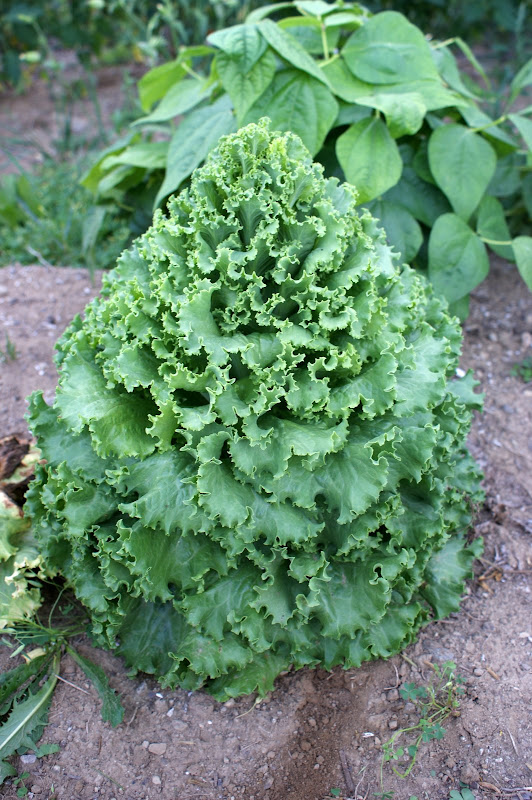Dry and hot. How has this affected the crops? We have lost several crops to the dry conditions: Lots of lettuce: We plant many more than we actually need, so usually we can harvest enough for the CSA-- except for last Friday and this Tuesday.
Herbs: As with lettuce, we do successions plantings, such that we can distribute cilantro, dill, parsley, or basil on successive weeks. Dill and cilantro are only good for one or two cuts, so those are planted frequently. A number of these plantings withered in the dry, hot conditions at planting time, or else, they go to seed too quickly.
The premature development of a seed stalk in a head of lettuce, cabbage, or basil and cilantro is called bolting, and it is a direct function of heat and drought. Here is what it looks like: Little Christmas trees

Unfortunately all we have for irrigation in our two major fields this year is a 1 ton bulk tank of water that we fill up at the well, and set up to gravity drip on our newly planted rows.
Last week we learned a little bit of history about the farm from a neighbor who used to work with the Meserve family before the Scarborough Land Conservation Trust bought the property. Back in the 1980s when Keith Meserve kept poultry in just about every building besides the farmhouse, all of the water needs for the farm came from the dug well in the dooryard. Pipes dive in and out of the subterrainian walls of this 20 foot well.
Our neighbor Bill, told us that in an average dry year, the well would run dry and Keith Meserve would run a pipe back to the spring across Broadturn Road through a culvert that disappeared when the road was rebuilt in 2006. We visited the spring to see if we might be able to develop this resource for our crops and livestock. The first time I found the spring it was winter (pretty much the only time I get out into the woods) and I fell in up to my knee in the icy water. This time I fell in again, and again, the water was icy cold. It appears to be enough water to make its use worthwhile, but of course aside from our utilitarian assessment, we are in love with the idea of a spring. It bubbles up through the roots of trees; spongy moss and grass lay over the crystal clear 5 foot depths. Stacy's eyes sparkled all day with thoughts of Manon of the Spring (one of our favoroite films), and I thought of water worship and Turkish baths. We happen to be reading Tuck Everlasting with Flora. (But the Meserve brothers and those thousands of chickens all proved mortal, so we're guessing that will have to stay a fantasy) But the allure of eternal life, water, bubbling up from the ground is surely goodness enough.
The Harvest:
Napa Cabbage
Fennel
Tomatoes
Alisa Craig Onions
Carrots
Basil
Squash (summer and zucchini)
Cucumbers
Swiss Chard
Peppers
The tomatoes are ready! As always, we try to harvest them when they are ripe. That is what gives them an amazing flavor. But they are extremely fragile. Usually the top of the fruit is more firm, so we place them upside-down, on their sometimes green “shoulders.” I usually cut the top off, but the remainder of a nice big tomato is still a meal in itself. A sit-down meal. With napkins. We have so many favorite ways to eat them, but in the morning with eggs they are best lightly heated in the frying pan until the juice sizzles out and mingles with the orange yellow of the egg yolk. Amazing.
The team from Open Waters Theatre Arts will be having a "CSA Story Circle" in the Broadtrun Farm long barn on Tuesday from 12:30 until 3:30... Lunch will be provided! Come and pick up your share and share a story about food, the CSA, or the farm.
Blessings on the meal,
John






No comments:
Post a Comment